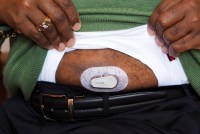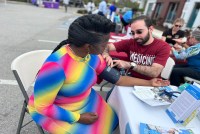Latest KFF Health News Stories
Para pacientes de cáncer sin seguro, conseguir atención médica es una lotería
Los estudios demuestran que, a veces, los adultos sin seguro retrasan la atención, lo que puede perjudicar las probabilidades de supervivencia. Pero que los pacientes obtengan un seguro para cubrir el tratamiento se parece un poco al juego de la ruleta, es decir, depende de dónde vivan y del tipo de cáncer que padezcan.
Abortion Clinics in Conservative-Led States Face Increasing Legal Threats
Since the U.S. Supreme Court reversed federal protections for abortions, medical providers in conservative-led states have been fighting legal and political battles — as well as escalating threats from the anti-abortion movement.
For Uninsured People With Cancer, Securing Care Can Be Like Spinning a Roulette Wheel
When uninsured people are diagnosed with cancer, accessing resources and paying for treatment can be daunting. The safety nets meant to help often fall short, say cancer physicians and health policy experts who study access to care. Some patients find it easier to play the odds.
Special Medicaid Funds Help Most States, but Prompt Oversight Concerns
Georgia is among 35-plus states that have used an under-the-radar federal funding mechanism to boost payments for hospitals and other providers under Medicaid. But a government watchdog and a congressional advisory commission say sparse oversight makes it hard to tell if the “directed payments” program is meeting its goals.
Journalists Explain Impact of Texas Judge’s ACA Decision and Cuts in Federal Food Benefits
KHN and California Healthline staff made the rounds on national and local media this week to discuss their stories. Here’s a collection of their appearances.
No-Cost Preventive Services Are Now in Jeopardy. Here’s What You Need to Know.
A federal judge’s recent ruling on the Affordable Care Act is by no means the final word. Even parsing its impact is complicated. Here are key issues to watch as the case works its way through the legal system.
Montana May Require Insurers to Cover Monitoring Devices for Diabetes
Montana is one of several states considering expanding coverage of continuous glucose monitors, but insurance companies and some providers argue that not all people with diabetes need them.
High Inflation and Housing Costs Force Many Americans to Delay Needed Care
A recent Gallup Poll suggests that Americans are putting off medical care because of costs. Inflation and rising rents make it harder for people to make ends meet.
Gov. Newsom Wanted California to Cut Ties With Walgreens. Then Federal Law Got in the Way.
Gov. Gavin Newsom declared that California would cut ties with Walgreens after the company said it would not distribute abortion pills in some states. But federal rules make it difficult for the state to unwind its Medicaid prescription drug agreement, which paid Walgreens $1.5 billion last year.
The Big Squeeze: More Enrollees and Smaller Networks Plague Some ACA Plans
Despite record enrollment in health insurance plans under the Affordable Care Act, some consumers who bought coverage and agents who helped them do so have had a tough start to the new year: Many say it’s hard to find an in-network doctor or hospital.
Dentro de una de las pocas escuelas secundarias para adolescentes con adicciones
Hay 43 en todo el país y están diseñadas para estudiantes que se están recuperando de una adicción, y que también podrían estar lidiando con trastornos de salud mental relacionados.
‘Hard to Get Sober Young’: Inside One of the Country’s Few Recovery High Schools
A few dozen high schools across the U.S. combine education with recovery treatment for substance use disorders to keep kids sober and in school.
Fatigue Is Common Among Older Adults, and It Has Many Possible Causes
Persistent fatigue — the feeling of having no energy — can contribute to frailty and affects 40% to 74% of older patients with chronic illness. Yet its causes can be elusive.
Raincoats, Undies, School Uniforms: Are Your Clothes Dripping in ‘Forever Chemicals’?
The full health risks of wearing apparel made with PFAS, also known as “forever chemicals,” are still unknown. But states are taking action so clothing makers will remove them.
Minnesota Overhauled Substance Use Treatment. Rural Residents Still Face Barriers.
A recent policy change in Minnesota promotes quick evaluations and care for people with substance use disorders. But because of gaps riddling rural treatment systems nationwide, the promise of swift care isn’t reaching rural Minnesotans.
States Step In as Telehealth and Clinic Patients Get Blindsided by Hospital Fees
At least eight states have implemented or are considering limits on what patients can be billed for the use of a hospital’s facilities even without having stepped foot in the building.
FDA Evaluates ‘Safety Concerns’ Over Dental Devices Featured in KHN-CBS Investigation
A KHN and CBS News investigation found that a dental appliance called the AGGA has been used by more than 10,000 patients, and multiple lawsuits allege it has caused grievous harm to patients.
Readers and Tweeters Are Horrified by Harm Tied to Dental Device
KHN gives readers a chance to comment on a recent batch of stories.
In Texas, Medicaid Coverage Ends Soon After Childbirth. Will Lawmakers Allow More Time?
Pregnancy-related Medicaid coverage ends just two months after childbirth in Texas — some advocates and researchers say that cutoff contributes to maternal deaths and illnesses in the state.
La decisión podría afectar los exámenes de detección sin copago y servicios preventivos similares que la mayoría de los estadounidenses con seguro tienen como parte de sus planes de salud.
























